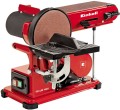Motor power
Rated power of the electric motor of the machine. The more powerful the engine, the higher the speed and intensity of processing can be, the larger discs can be used with the machine and the better it is suitable for working with hard, stubborn materials. On the other hand, a powerful motor consumes a lot of energy (which may require special connection — see "Power") and significantly affects the dimensions, weight and price of the entire unit. Therefore, manufacturers choose this parameter based on the type (see "Machine") and the desired characteristics of speed, productivity, etc. In fact, this means that engine power is rather a secondary parameter, and when choosing, it makes sense to pay attention to more practical points — disk diameter, rotation / movement speed, etc.
Disc diameter
Regular diameter of the disk (see "Working element") used by the machine for dry processing (see above). When grinding and polishing, usually, we are talking about the maximum diameter of the disk that can be installed on the tool — a larger nozzle will either be ineffective or not fit into the dimensions of the seat at all, but a smaller diameter disk, usually, is installed without problems (of course, if the hole diameter matches — see below). For grinding machines, the diameter of the disc corresponds to the diameter of the sanding pad, which is necessary for the full use of the disc.
The larger the regular disk — the heavier and more powerful the machine, usually, the better it can cope with complex work of a large volume. At the same time, for small everyday tasks like periodically sharpening knives or chisels, a small disc is quite enough.
Disc speed
The nominal speed of rotation of the disk for dry processing (see above), provided by the machine; for models with adjustable rotation (see below), the maximum rotation speed.
For the same disc diameter and material, a higher speed provides more intensive processing, and a slower rotation contributes to accuracy and precision. In addition, optimal speeds depend on the composition of the disc and the material being processed; detailed recommendations with specific figures for a particular situation can be found in special sources.
A separate category is grinding machines with disk-shaped working elements: in such units, the actual speed of movement of the disk surface relative to the workpiece depends on how close the contact point is to the centre of the disk.
Belt length
The length of the belt used in a machine with grinding functions (see "Machine"), more precisely, the total length of the entire belt ring installed on the machine.
This information is necessary to select the correct sanding belts — matching in length is essential for the proper installation and operation of the attachment. In this case, the working length, usually, is more than 2 times less than the total, and to determine it, it is worth focus on the dimensions of the desktop (see below).
Belt rotation speed
The nominal belt speed provided by the machine with the grinding function (see "Machine"). Other things being equal, a higher speed is useful for ensuring intensity and productivity, a lower speed allows for more precise control of the process. Detailed recommendations with specific figures for a particular situation can be found in special sources.
Work table size
The dimensions of the desktop provided in the design of the machine.
The working table is called the plane on which the workpiece is placed during processing. In general, the larger this plane, the larger the part can be machined without problems. At the same time, individual nuances may vary depending on the design features: for example, grinding machines for a sleeve (see "Working item") allow you to work with parts that are larger than the desktop without much difficulty, and in tape models, the length of the table actually corresponds to the working length sanding belt (and the maximum length of the surface that can be processed at one time).

